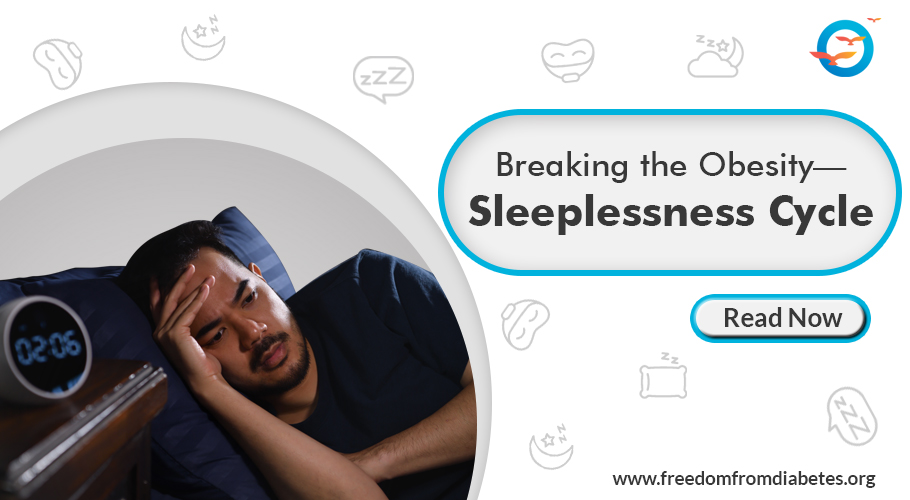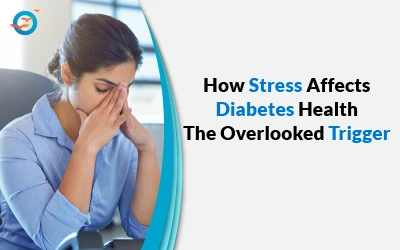Sleep and Obesity: Breaking the Obesity Sleeplessness Cycle.

Being overweight brings its own unique set of problems, from health-related issues to day-to-day conveniences, like finding comfortable seating, shoes, clothing, etc. While these are definitely frustrating, we often overlook a more insidious problem that the overweight have to deal with, not just through the day, but at night too. Sleep!
Conventional wisdom long held the notion that weight was a result of nutrition and activity. But we are much better informed now. Studies after studies, not to mention our own experiences, have shown that there is more to being overweight than calorie surplus and sedentary living—though these remain primary factors. One also needs to consider aspects like genetics, socio-economics, community & environmental factors, stress, and, yes, sleep quality.
Low quality of sleep is now known to be a risk factor for obesity. Ironically, it is also a result of obesity. In other words, not only does low sleep quality trigger weight gain, but just by virtue of being overweight, one suffers sleep issues. This, in turn, causes further weight gain…and the spiral continues downwards. It can be incredibly frustrating, but there are solutions, and the first step is to understand the connection between lack of sleep and weight gain.
The Sleep Deprivation-Weight Gain Connection
Two hormones, leptin, and gherkin regulate our appetite. When you get insufficient sleep it triggers an imbalance in the production of these hormones so as to sharpen hunger pangs, leading to overeating. Lack of sufficient and good quality sleep also elevates levels of the stress hormone cortisol and creates a deficiency of growth hormone. Both these are linked to obesity, as well.
Another aspect that all these hormones have in common is that they promote a preference for what is euphemistically described as ‘comfort food’ viz. high calorie, salty, sweet, or fried foods. Furthermore eating late at night—which one might tend to do if one is unable to sleep—is a big risk factor for weight gain.
Lack of sleep also affects physical activity. Which makes sense, Sleep loss is bound to show up as drowsiness and lethargy the next day.
1. Obesity and sleep in children
Children, as we already know, need more sleep, as many important physical and mental developments take place when they are sleeping. Lost of sleep during childhood increases the risk of becoming overweight. It also triggers the same hormonal disruptions as in adults and leads to daytime fatigue. Low quality and quantity of sleep are also associated to bad food choices in kids, leading to consumption of nutrient-deficient foods, less fresh fruit, and vegetables.
2. Common Sleep Concerns
The sleep problems described here are not the sole domain of the overweight; other individuals too can suffer from them. But the presence of one or more of these conditions is especially problematic for those who are overweight as they tend to aggravate the sleep issues caused by obesity.
3. Obstructive Sleep Apnea (OSA)
When the airway collapses—partially or fully—causing breathing issues and snoring, it is called OSA. This is a common problem in obese populations, and the symptoms are more severe.
4. Gastroesophageal Reflux Disease (GERD)
GERD is a common and chronic problem caused when stomach contents leak into the oesophagus. The result is heartburn. Obesity is a big risk factor for the condition, and its symptoms are worse when one is prone. This is why late-night eating is not recommended. Try to get your last meal of the day at least two hours before bedtime.
5. Depression
As is being obese wasn’t enough to be depressed about, it turns out that the two have a reciprocal connection. (Talk about toxic relationships). In other words being overweight can trigger depression, which in turn leads to unhealthy eating habits, and weight gain. Depression is also known to affect sleep quality, and is seen in the majority of insomniacs.
6. Asthma
Excess weight increases the risk of developing asthma—when the airway becomes inflamed. Asthma patients commonly experience symptoms at night, which in turn makes it difficult for them to fall asleep.
7. Osteoarthritis
Excess weight has a direct bearing on the joints, by virtue of the additional strain the weight puts on joints and cartilage. Osteoarthritis has a cyclic connection with sleep as it brings pain, depression, and disturbs sleep, which in turn worsens obesity, which leads to unhealthy food choices, etc.
Breaking the Spiral of Bad Sleep and Obesity.
As we have seen obesity and sleep are inter-related, so alleviating one is bound to have a salutary effect on the other. Here’s what you can do.
-
Exercise
Beyond the obvious positive impact, exercise has on weight, it is also known to improve sleep quality. It can reduce symptoms of OSA. Try to get your exercise in the sunlight. Exposure to natural light has a benign effect on health and promotes a healthy sleep-wake cycle. -
Establish a Healthy Sleep Routine
Some measures you can take are staying away from electronic screens for a couple of hours before bedtime, eating by 8.00 pm, meditation, prayer, lowering the temperature, blocking light and noise. -
Get a Good Mattress
Your mattress should enable proper spinal alignment. It is important to test the mattress, as body weight is a factor in mattress comfort. -
Maintain a Healthy Diet
Take steps to get a balanced diet. Cut out high glycemic foods, simple carbs, and fats. Unhealthy diets have been seen to decrease one’s ability to sink into a deep sleep.
Conclusion
Obesity should not be taken lightly—excuse the pun—as it brings a slew of health issues, like diabetes, BP, PCOD/S, etc. Our programs, both diabetes-reversal and weight loss programs, incorporate protocols for diet, fitness, stress management, and medical supervision have consistently returned exceptional results. 100% of all our participants, since we were established, have seen tremendous weight loss. In fact, the average participant of our program loses about 10 kg. And, this, is just a side effect to the normalized blood sugar levels.
Disclaimer
The content shared in FFD’s articles are not intended to supplant professional medical advice. Please check with your doctor before making any changes to your lifestyle.

